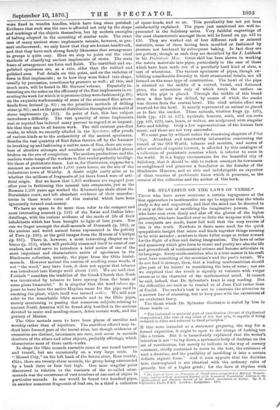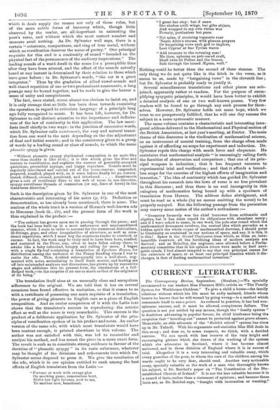DR. SYLVESTER ON THE LAWS OF VERSE.*
TROSE who have never overcome a certain repugnance at the first approaches to mathematics are apt to suppose that the whole study is dry and unpoetical, and that the mind can be devoted to it only at the cost of sacrificing the imaginative powers. Those who have seen even dimly and afar off the glories of the higher geometry, who have handled ever so little the weapons with which its conquests are made, know full well that the very reverse of this is the truth. Nowhere is there more need for the quick sympathetic insight that seizes and binds together things seeming to be wide asunder ; nowhere is there fuller scope or richer reward for the flight of a free and daring imagination. The laws of order and symmetry which give form to music and poetry are also the life and groundwork of mathematical science and become articulate in its language. Every mathematician who is a true master in his craft must have something of the musician's and the poet's nature. We do not find it strange, then, that a leading mathematician should give part of his leisurd to considering the laws of verse ; nor are we surprised that the result is signally at variance with vulgar errors as to the character of the mathematical mind. It cannot be said, indeed, that Dr. Sylvester's tract is easy reading. But the difficulties are such as to remind us of Jean Paul rather than of Euclid. The reader's task is not to constrain the attention to a narrow line of reasoning, but to keep pace with the excursions of an exuberant fancy.
The thesis which Dr. Sylvester illustrates is stated by him in these words :— " The technical or material part of versification (the art of rhythmical composition), like that of any other of the fine arts, is capable of being reduced to rules and referred to fixed principles."
If this were intended as a statement preparing the way for a formal exposition, it might be open to the charge of looking too like a truism. But it is immediately explained that the writer's intention is not " to lay down a systematic body of doctrine on the art of versification, but merely to indicate in the way of cursory comment, chiefly contained in notes to the text, the existence of such a doctrine, and the possibility of moulding it into a certain definite organic form." And it soon appears that the doctrine here contemplated is not identical with the ordinary rules of prosody, but of a higher grade ; for the laws of rhythm with • The Laws of Verse; or, Principles of Versification exemplified in Mdrical Transla- lions ; together with an Annotated Reprint of the Inaugural Presidential Address to the Mathematical and Physical Section of the British Association at Exeter. By J. J. Sylvester, LL.D., F.E.S. London : Longmatts. 1870. which it deals supply the reason not only of those rules, but of the more subtle forms of harmony which, though little observed by the reader, are all-important in animating the poet's verse, and without which the most correct number and measure avail nothing. As Dr. Sylvester well says, there is a certain " coherence, compactness, and ring of true metal, without which no versification deserves the name of poetry." One principal requisite for this end is a continuity of sound " founded on the physical fact of the permanence of the auditory impressions." The leading sounds of a word dwell in the sense for a perceptible time after they have been uttered, and the effect of the sounds actually heard at any instant is determined by their relation to those which have gone before ; in Dr. Sylvester's words, " the ear is a great integrator." Thus by the gradation of allied vowel-sounds and well-timed repetition of one or two predominant consonants, a long passage may be bound together, and be made to give the hearer a sense of unity and completeness.
The fact, once stated, seems almost too obvious to insist on, and it is only strange that so little has been done towards examining the operation in regard to articulate language of a principle long ago fully recognized in music. It has been left, however, for Dr. Sylvester to call distinct attention to the importance and definite- ness of the law of continuity in this application. The law mani- fests itself chiefly in two ways : in the junction of successive words, which Dr. Sylvester calls anastomosis, the easy and natural transi- tion from one word to the next depending on the due adjustment of final and initial sounds ; and in the consistency given to a group of words by a leading sound or class of sounds, to which the name phonetic syzygy is given.
"Without phonetic syzygy rhythmical composition is no more like verse than shoddy is like cloth ; it is this which gives the fibre and texture to versification, and explains the success of generally-accepted quotations, proverbial sayings, and happy repartees. Sounds must be regularly introduced and carried out of the verse-canvas ; suspended, prepared, recalled, played with, as it were, before finally let go, concen- trated, diffused, crossed, perplexed, and interlaced Anastomosis gives a sort of rectilinear fibre to the web of verse in one direction, syzygy curvilinear threads of connection (or say, lines of force) in the transverse direction."
Such is the description given by Dr. Sylvester in one of the moat characteristic and interesting of his notes (p. 46). Definition or demonstration, as has already been mentioned, there is none. The nucleus of the whole tract is a version of Horace's well-known ode to Maecenas (book iii., 29), and the present form of the work is thus explained in the preface :—
" The subject has grown upon me in passing through the press ; and the book has been built up in a most unforeseen and unpremeditated manner, which I state in order to account for the numerous dislocations, ill-fittings, gaps, and other irregularities of structure, as well as occa- sional repetitions, which I must beg the courteous reader to overlook or excuse. In fact, the work may be truly said to have been born, cradled, and nurtured in the Press, nay, often to have fallen asleep there, to awake like a baby refreshed, hungry and calling for more. I began with a single fly-leaf containing a translation of Tp-rhena Region, for distribution among the audience at the Penny Reading where I was to recite the ode. This, doubled subsequently into a half-sheet, aug- mented with notes, assimilating to itself fresh matter, and leading me off into unintended analyses and discussions, has grown up by successive stages and additions into its present form, the simulacrum of a full- fledged book,—to the surprise of no one so much as that of the originator of its being."
The translation itself aims at an unusually close and scrupulous adherence to the original. We are told that it has on several occasions been found effective in recitation, so that it comes to us with a certificate of possessing one main requisite of a translation, the power of giving pleasure to English ears as a piece of English composition. And an ocular comparison of it with the Latin text shows that the translator's success in reproducing the artistic effect as well as the sense is very remarkable. This success is the product of a deliberate application by Dr. Sylvester of the prin- ciples of versification spoken of in his preface and notes. An earlier version of the same ode, with which most translators would have been content enough, is printed elsewhere in this volume. The author was not satisfied with this, was led to reconsider and analyze his method, and has recast the piece in a more exact form. The result is such as to constitute strong evidence in favour of the doctrine of " phonetic syzygy" in its main substance, whatever may be thought of the divisions and refinements into which Dr. Sylvester seems disposed to press it. We give the conclusion of the ode, which is in our opinion entitled to rank among the best efforts of English translators from the Latin :-
"Fortune at work with savage glee On mocking game, remorseless bent, Shifts her light favours, now to me, To another now, beneficent. "I greet her stay: but if anew She shakes swift wings, her gifts abjure, And wrapped in my own virtue woo Poverty, portionless but pure.
"Not mine, if straining topmasts roar 'Neath Afric's storms, with piteous prayers Or bargaining vows each god to implore, Lest Cyprus' or fine Tyrian wares "Add treasure to the ravening seas! Me then, upborne on pair-oared craft, Shall twin-lit Pollux and the breeze, Safe through the tossed lEgean, waft."
Nothing could be better than the second of these stanzas. The only thing we do not quite like is the hitch in the verse, as it seems to us, made by "bargaining vows" in the eleventh line ; but Dr. Sylvester is probably ready to justify it.
Several miscellaneous translations and other pieces are sub- joined, apparently rather at random. For the purpose of exem- plifying syzygetic principles, it would have been better to exhibit a detailed analysis of one or two well-known poems. Very few readers will be found to go through any such process for them- selves. However, Dr. Sylvester holds out some hope, which we trust to see prosperously fulfilled, that he will one day resume the subject in a more systematic manner.
The same volume contains a characteristic and interesting inau- gural address delivered to the Mathematical and Physical section of the British Association, at last year's meeting, at Exeter. The main theme of this discourse is the vindication of mathematical science, as an instrument of mental training, from the charge often made against it of affording no scope for experiment and induction. Dr. Sylvester repels this charge with much force and eloquence. He maintains that mathematical analysis "is unceasingly calling forth the faculties of observation and comparison ; that one of its prin- cipal weapons is induction ; that it has frequent recourse to experimental trial and verification ; and that it affords a bound- less scope for the exercise of the highest efforts of imagination and invention." The idea of continuity which has guided Dr. Sylvester throughout his research into the laws of verse is no leas prevalent in this discourse ; and thus there is no real incongruity in this eulogium of mathematics being bound up with a specimen of translation from Horace. The address defies abridgment, and must be read as a whole (by no means omitting the notes) to be properly enjoyed. But the following passage from the peroration may convey some notion of the author's enthusiasm :—
"Geometry formerly was the chief borrower from arithmetic and algebra, but it has since repaid its obligations with abundant usury ; and if I were asked to name, in one word, the pole-star round which the mathematical firmament revolves, the central idea which pervades as a hidden spirit the whole corpus of mathematical doctrine, I should point to Continuity as contained in our notions of space, and say, it is this, it is this! Space is the Grand Continuum from which, as from an inex- haustible reservoir, all the fertilizing ideas of modern analysis are derived; and as Brindley, the engineer, once allowed before a Parlia- mentary committee that in his opinion rivers were made to feed navi- gable canals, I feel almost tempted to say that one principal reason for- the existence of space, or at least one principal function which it dis- charges, is that of feeding mathematical invention."































 Previous page
Previous page